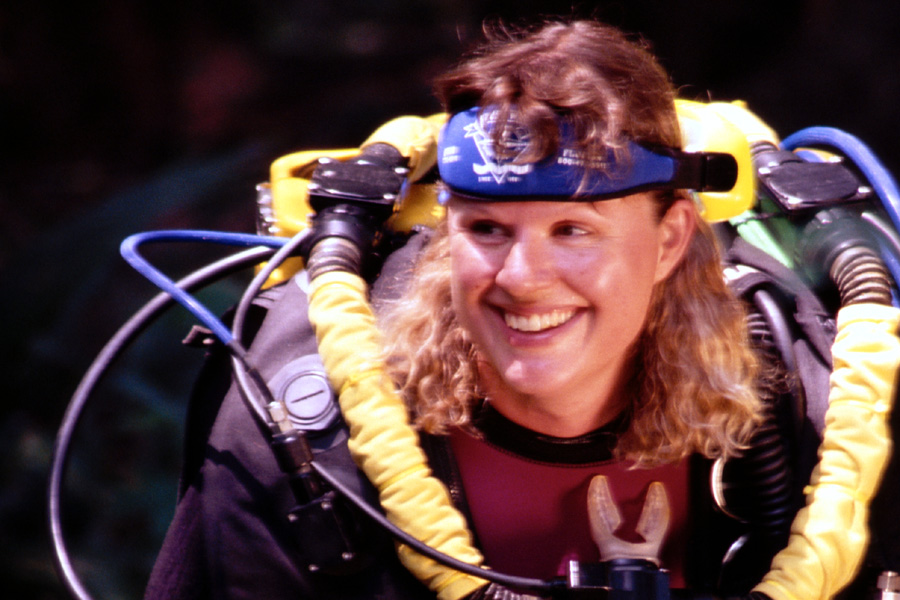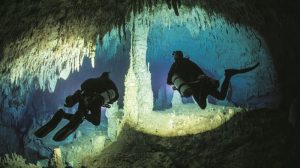
This month’s Kickass Women in History doubles as a book review. Jill Heinerth is a cave diver who recently published Into the Planet: My Life as a Cave Diver. Heinerth specializes in exploring new underwater caves. She is also a writer, photographer, and filmmaker.
Heinerth grew up in Canada, near Toronto. She learned to dive recreationally while working as a graphic artist. She loved diving so much that she left her lucrative business to become a full-time diving instructor in the Cayman Islands. There she met Paul Heinerth, an experienced cave diver. She moved to Florida where they married and ran a dive shop together. They went on many expeditions together and separately, charting unexplored territory in Mexico, Florida, and Antarctica and creating maps and documentaries with frequent collaborators Bill Stone (engineer and frequent expedition leader) and Wes Skiles (filmmaker).

As one of the few women in a male-dominated sport, Heinerth struggled with sexism:
It was lonely sitting among a group of male technical diving instructors at a yearly workshop and being overlooked for a leadership role. It was sad to hear men at dive sites talk about their life partners as “the wife.” I was disappointed when my Cave Instructor evaluation was more like a college hazing than an objective evaluation. I didn’t have many female friends who understood what I was facing, other than Paul’s first wife, Shannon, who was a font of support in those days. Her risk-taking days were over, having given up cave diving for motherhood, but she knew what I was experiencing. As a former cave-diving explorer herself, she knew that living in Paul’s shadow could be tough. As a pioneering woman in a male-dominated endeavor, just like Shannon had been, I felt I had to perform better than the average man just to be taken seriously.
In her book, Heinerth talks about the high fatality rate among cave divers. Cave diving is an especially dangerous type of diving because the diver is cut off from the surface. Rescue is usually impossible. In Heinerth’s case, she is not only cave diving but also finding new ways in and out of previously unexplored areas. In her book, Heinerth points out that serious cave divers can’t get life insurance. She also explains how she uses fear to her advantage and how she avoids panic when things go wrong. She is forthright about her vulnerabilities and often funny, as when, on an occasion in which she finds herself trapped in a cave, she thinks to herself, “I gotta get out of here! My husband doesn’t know how to do the taxes!”

After losing many friends to diving accidents, Heinerth decided that she would cave dive only when it serves a purpose beyond adventure or ego. She focuses today on projects that are scientifically significant and/or educationally significant. She and her second husband, Robert McClellan, made a film and put together an educational presentation called We Are Water, which teaches people about the importance of preserving water around the earth. They have gone on to work on other educational projects about water conservation.
Heinerth’s writing isn’t the smoothest, but she’s great at revealing all the preparation that goes into cave diving, all the hauling gear and cleaning equipment, and the thrill and the danger of being underwater. In some caves, divers can drive right up to the edge of the cave and jump in (many caves in Florida are like this). Accessing other caves requires miles of hiking through rough terrain while carrying heavy equipment. At other times, Heinerth found herself mapping large cave systems that ran not only under remote areas of land but also under piers and restaurants. Heinerth does a good job of conveying the vast amount of support that every serious diver needs on each expedition as well as the beauty she encounters in the caves and her motives for diving.Several times throughout the book, Heinerth reflects on how certain challenges and disappointments have shaped her. Here she revisits the issue of sexism:
Perhaps my encounters with sexism formed part of my life mission. I wanted to be regarded as an accomplished explorer rather than as an accomplished femaleexplorer. I wanted to encourage other women to fulfill their dreams despite imposed gender barriers. I wanted other women to know that difficult endeavors are possible and success is worth celebrating. I didn’t want to be the lone girl on the boat.
For more about Jill Heinerth, check out her appearance on NPR’s Fresh Air. You can also watch her book trailer. TW for claustrophobia and aquaphobia!



Fantastic, thanks for sharing.